

|
| weblog/wEssays archives | home | |
|
Housing Bubble Bust Will Take Down the Global Economy (May 8, 2006) The U.S. housing bubble deflating will take down the global economy. Here's how. 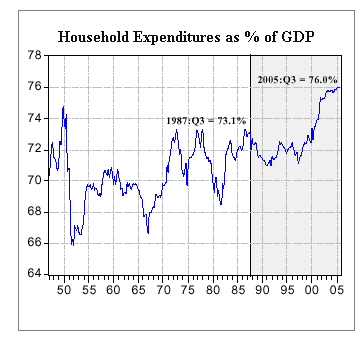
1. The U.S. economy consists largely of consumer spending. This dependence has reached an unprecedentedly high level. (see chart to right) As consumer spending goes, so goes the economy. The last time the economy was even close to being so dependent on consumer spending was 1950. After World War Two ended, the demand which had been pent up during the war years, when civilian production had been curtailed in order to manufacture war materials, was finally unleashed. As defense spending fell, consumer spending rose. Now the demand stems not from needs being unmet but from cascades of "cheap money" borrowed from home equity. (see below) 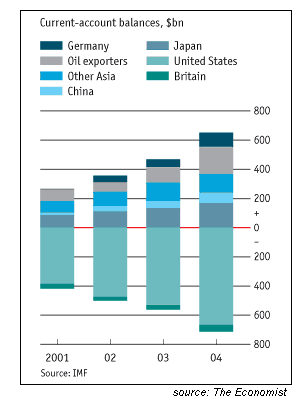 2. The global economy is heavily dependent on the U.S. consumer.
2. The global economy is heavily dependent on the U.S. consumer.
As this chart shows, every major economy runs a current account surplus, i.e. trade surplus, with the exception of Britain, which has a modest trade deficit. Fundamentally, the U.S. offsets all these surpluses with a truly massive trade deficit. In other words, U.S. consumers buy all our trading partners' surplus production. If the U.S. consumer stops buying, these trade surpluses vanish and these nations slip into recession. While some wishful-thinking pundits claim domestic demand can make up for faltering U.S. demand, the sheer size of the U.S. deficit gives the lie to such hopes. It is currently running at over $800 billion a year--a staggering amount which smaller economies cannot possibly replace with domestic demand. (Recall that the U.S. economy dwarfs all others). 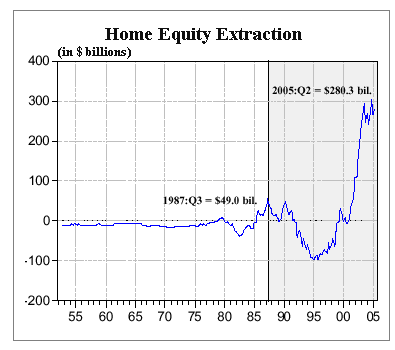 3. U.S. consumers have financed this vast spending spree by borrowing
stupendous quantities of money from their home equity. As the chart reveals, Americans'
home equity actually rose in the 1990s. (Since this graph displays extraction of equity
rather than growth of equity, the -$100 billion notched in 1995 means that homeowners "extracted"
a negative number--that is, their equity rose by $100 billion.)
3. U.S. consumers have financed this vast spending spree by borrowing
stupendous quantities of money from their home equity. As the chart reveals, Americans'
home equity actually rose in the 1990s. (Since this graph displays extraction of equity
rather than growth of equity, the -$100 billion notched in 1995 means that homeowners "extracted"
a negative number--that is, their equity rose by $100 billion.)
As you can see, homeowners have been withdrawing equity from their homes at an unprecedented rate for the past few years--a fact I documented in my May 2 entry, "Housing Wealth Effect Shifts into Reverse." Here's how much money has been extracted from home equity since 2000--about $2.5 trillion: 2000 | $204 bil. 2001 | 262 bil. 2002 | 398 bil. 2003 | 439 bil. 2004 | 599 bil. 2005 | 751 bil. 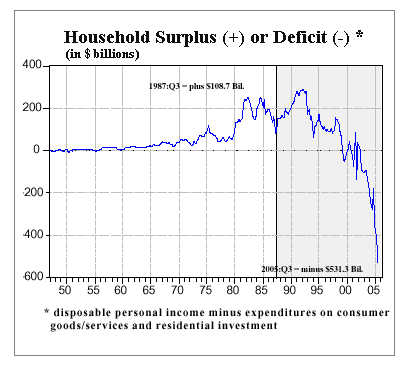 4. U.S. consumers are spending far more than they earn ( i.e. disposable
personal income.) This reliance on borrowed money for spending is unprecedented.
4. U.S. consumers are spending far more than they earn ( i.e. disposable
personal income.) This reliance on borrowed money for spending is unprecedented.
It's difficult not to be dumbfounded by this chart, which shows that U.S. consumers are spending hundreds of billions in excess of their actual earnings. The connection between this chart and the preceding ones is obvious: Americans have extracted vast sums from their home equity and spent it in the global marketplace, creating mind-bogglingly massive trade deficits with other nations. 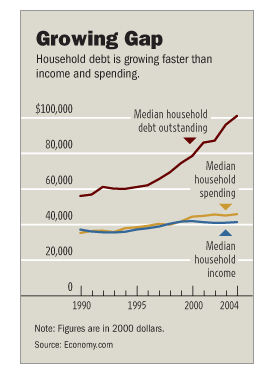 5. Is this unprecedented borrowing and deficit spending sustainable? We all know the answer is no.
Clearly, this enormous debt machine is entirely dependent on the continuing rise of home
equity. Now that home prices have leveled off or dropped, U.S. homeowners
can no longer count on heady increases of equity to fund their future borrowing.
5. Is this unprecedented borrowing and deficit spending sustainable? We all know the answer is no.
Clearly, this enormous debt machine is entirely dependent on the continuing rise of home
equity. Now that home prices have leveled off or dropped, U.S. homeowners
can no longer count on heady increases of equity to fund their future borrowing.
6. Housing need not drop precipitously to cause a precipitous drop in home equity extraction. House prices need only stop rising to cut off the incredibly vast flow of borrowing/home equity extraction. (Rising interest rates will also help to staunch the flow.) 7. Once this monumental extraction of equity dries up, so will consumer spending. As you can see on this chart, wages have been basically flat since 2000. Therefore, consumer spending cannot be attributed to wage increases; it can only be attributed to this equity extraction. Once that dries up, consumer spending will drop significantly: by roughly $600 billion a year, or 5% of the entire U.S. GDP. This would return consumer spending as a percentage of the GDP to levels which are more in line with recent history. 8. Once U.S. consumer spending plummets, our global trading partners will immediately feel the pinch. Once their export sales and earnings drop, their economies will slide into recession. (Recall that exports are a much larger share of their economies than they are in the U.S. economy). Noted economist Martin Feldstein draws the same conclusion in the current issue of Foreign Affairs: The Return of U.S. Savings. The links of the chain cannot be denied; as the U.S. housing market rolls over into decline, it will take home equity borrowing with it, which in turn will take the U.S. economy and thus the world economy down into a prolonged recession. Skeptical? Watch what happens in October 2006. For more on this subject and a wide array of other topics, please visit my weblog. copyright © 2006 Charles Hugh Smith. All rights reserved in all media. I would be honored if you linked this wEssay to your site, or printed a copy for your own use. |
||
| weblog/wEssays | home |